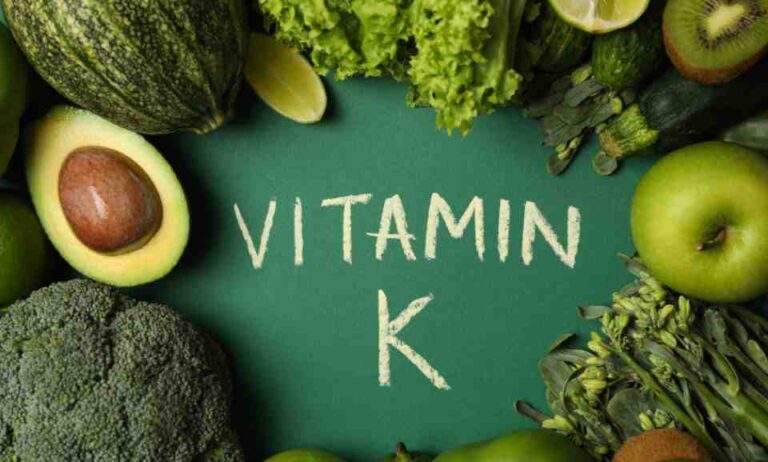Vitamin K is a fat-soluble vitamin that plays a vital role in many important functions in the body, especially in blood clotting, bone health, and cardiovascular health. This essential nutrient is found in a variety of foods, and its benefits extend beyond the basic functions we might initially associate it with. In this article, we’ll explore the numerous benefits of vitamin K and its importance for overall well-being.
What is Vitamin K?
Vitamin K is a group of fat-soluble vitamins, the two main types being K1 (phylloquinone) and K2 (menaquinone).
- Vitamin K1 is primarily found in green leafy vegetables, such as kale, spinach, and broccoli. It plays a significant role in blood clotting.
- Vitamin K2 is found in fermented foods and animal products. It supports bone health and cardiovascular health by regulating calcium levels in the body.
Health Benefits of Vitamin K
- Essential for Blood Clotting
The most well-known function of vitamin K is its role in blood coagulation. It helps activate proteins that are necessary for blood clotting, preventing excessive bleeding when injuries occur. Without vitamin K, the blood would not clot properly, leading to an increased risk of uncontrolled bleeding.Benefit: Vitamin K helps prevent excessive bleeding by supporting normal blood clotting. - Promotes Bone Health
Vitamin K is crucial for bone health because it helps in the regulation of calcium within the bones. It activates osteocalcin, a protein that binds calcium to the bone matrix, strengthening bone density and reducing the risk of fractures. Studies suggest that vitamin K deficiency can lead to bone weakness and an increased risk of osteoporosis.Benefit: Vitamin K supports bone health by promoting calcium absorption and improving bone density. - Supports Cardiovascular Health
Vitamin K also plays an important role in heart health by regulating calcium in the arteries. It activates proteins like matrix Gla-protein (MGP) that prevent calcium from accumulating in the blood vessels, thus reducing the risk of arterial calcification and cardiovascular diseases. This can contribute to a healthy heart and improved vascular function.Benefit: Vitamin K helps prevent arterial calcification, supporting cardiovascular health. - Improves Insulin Sensitivity
Some research suggests that vitamin K2 may help improve insulin sensitivity, reducing the risk of type 2 diabetes. It’s thought that vitamin K2 helps regulate the activity of certain proteins involved in insulin signaling and glucose metabolism.Benefit: Vitamin K may support healthy blood sugar levels and improve insulin sensitivity. - May Aid in Cancer Prevention
Some studies have shown that vitamin K, particularly K2, may have anti-cancer properties. Vitamin K2 is thought to inhibit the growth of cancer cells, especially in liver and prostate cancers. Though more research is needed, there is promising evidence that vitamin K may help reduce the risk of certain types of cancer.Benefit: Vitamin K, particularly K2, may help reduce the risk of certain cancers. - Supports Brain Health
There is emerging evidence that vitamin K plays a role in brain health. It is involved in the synthesis of sphingolipids, which are essential components of the brain’s cell membranes. Deficiency in vitamin K has been linked to cognitive decline, especially in older adults.Benefit: Vitamin K supports brain health and may help protect against cognitive decline.

Sources of Vitamin K
- Vitamin K1:
- Leafy green vegetables (spinach, kale, Swiss chard, collard greens, broccoli)
- Green peas
- Brussels sprouts
- Avocado
- Kiwi
- Vitamin K2:
- Fermented foods (natto, miso, sauerkraut)
- Dairy products (cheese, yogurt, butter)
- Animal products (chicken, beef liver, eggs)
- Some types of fish (salmon, mackerel)
Tip: Since vitamin K is fat-soluble, consuming these foods with a small amount of healthy fat (like olive oil or avocado) can improve absorption.
Symptoms of Vitamin K Deficiency
Vitamin K deficiency is relatively rare, but when it occurs, it can lead to several health problems, such as:
- Excessive bleeding or easy bruising: This is the most common symptom of a deficiency in vitamin K due to its critical role in blood clotting.
- Weak bones: Vitamin K deficiency can contribute to osteoporosis and increase the risk of fractures.
- Cardiovascular problems: Deficiency in vitamin K can lead to arterial calcification, which increases the risk of heart disease.
How Much Vitamin K Do You Need?
The recommended daily intake of vitamin K varies by age and gender, but general guidelines suggest:
- Men: 120 micrograms per day
- Women: 90 micrograms per day
For those who are at risk of deficiency (e.g., people with certain medical conditions or on long-term antibiotics), higher doses may be required, and it’s essential to consult a healthcare professional before making any changes.
Conclusion
Vitamin K is an essential nutrient that plays a crucial role in maintaining various aspects of health, from blood clotting and bone strength to cardiovascular health and insulin sensitivity. Including a variety of vitamin K-rich foods in your diet, such as green leafy vegetables, fermented foods, and animal products, is a great way to ensure you’re getting enough of this vital nutrient. If you are concerned about your vitamin K levels or have specific health conditions, it’s always a good idea to consult with a healthcare provider.



